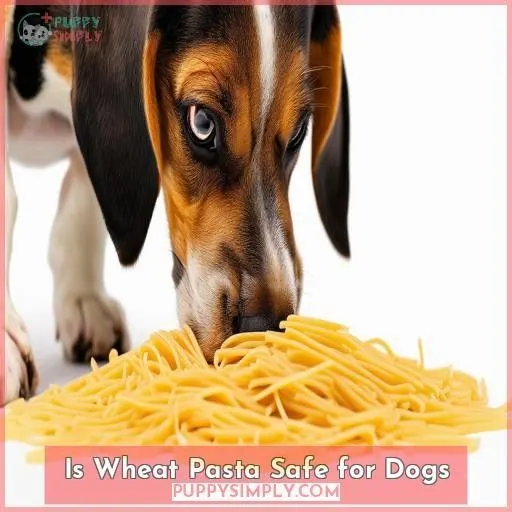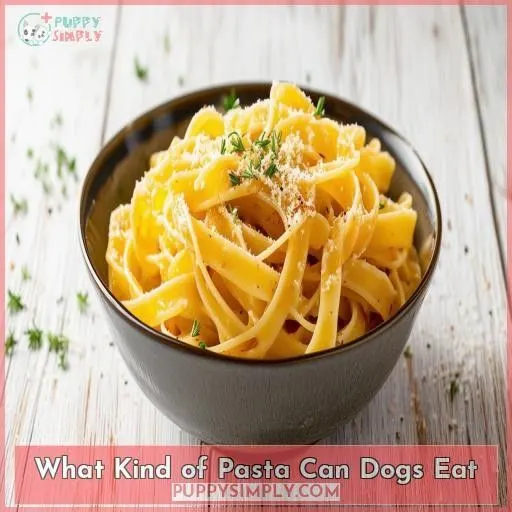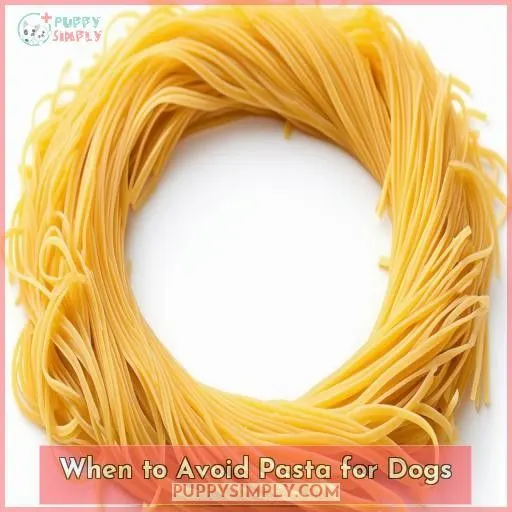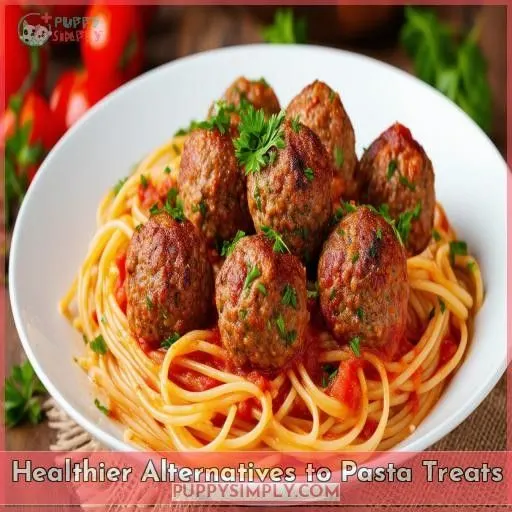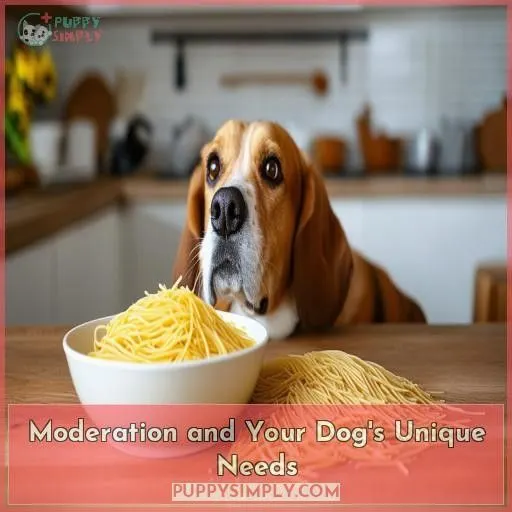This site is supported by our readers. We may earn a commission, at no cost to you, if you purchase through links.
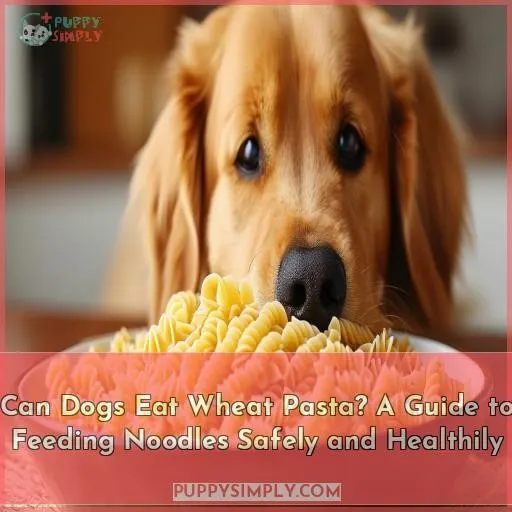
plain, cooked pasta is best—ditch sauces and seasonings that could upset your pup’s stomach. Whole wheat varieties provide an added fiber boost.
However, avoid uncooked pasta, as it’s a choking hazard. And steer clear if your furry friend has grain allergies or sensitivities.
For a healthier treat, opt for fresh veggies, lean proteins, or specially formulated dog snacks.
Want to learn the dos and don’ts of sharing your favorite noodles safely? Read on.
Table Of Contents
Key Takeaways
- Plain, cooked wheat pasta can be a tasty occasional treat for your furry friend, but like a strict drill sergeant, moderation must be enforced! Too many carbs and calories could pack on the pounds.
- While whole wheat varieties provide some fiber and nutrients like a vitamin-packed veggie on steroids, pasta still lacks the complete protein and balanced nutrition our canine companions need to thrive. It’s no dinner replacement!
- If your pup has a sensitive tummy or gluten gripes, wheat pasta could turn their insides into a battleground. Proceed with caution, and always look out for signs of distress like a neighborhood watchdog.
- For a healthier indulgence, opt for fresh fruits and veggies, lean proteins, or specially formulated dog snacks that’ll have your furry pal’s tail wagging with delight! No need to resort to the same old bowl of noodles.
Can Dogs Eat Wheat Pasta?
Yes, dogs can eat wheat pasta in moderation as an occasional treat. Wheat pasta isn’t toxic for dogs, but it provides little nutritional value and may cause gastrointestinal issues if fed in excess.
Is Wheat Pasta Safe for Dogs
While wheat pasta itself isn’t toxic for dogs, it can pose potential risks like allergic reactions, digestive issues, and weight gain due to its high carbohydrate content and lack of nutritional value. However, whole wheat pasta provides some fiber and nutrients compared to refined varieties, so moderation and portion control are key if incorporating it into your dog’s diet.
Potential Risks of Wheat Pasta for Dogs
While plain, cooked wheat pasta is safe for most dogs in moderation, there are potential risks to be aware of:
- Wheat contains gluten, which can trigger allergies or sensitivities in some dogs
- Excessive pasta can lead to weight gain due to high carb/calorie content
- Uncooked pasta poses a choking hazard and is difficult to digest
To minimize risks, introduce pasta slowly, monitor for signs of gluten intolerance (digestive issues, skin irritation), and limit portions. Remember, pasta lacks the nutrients dogs need, so treat it as an occasional snack, not a meal replacement.
Nutritional Value of Wheat Pasta for Dogs
While wheat pasta isn’t nutritionally dense for dogs, it does offer some benefits:
- Whole wheat pasta provides dietary fiber from resistant starches and inulin.
- These act as prebiotics, nourishing your pup’s gut microbiome.
- Whole grains also supply B vitamins and minerals like manganese.
However, pasta lacks complete proteins and other essential nutrients dogs need. It’s high in empty carbs too, so moderation is key to prevent weight issues.
What Kind of Pasta Can Dogs Eat
Regarding dog pasta consumption, plain, cooked pasta can be an occasional safe treat in moderation. Whole wheat pasta offers additional nutritional value like fiber and B vitamins, but all pasta should be given without sauces or seasonings that could be harmful.
Plain, Cooked Pasta
You can safely feed your dog plain, cooked pasta noodles in moderation. Follow these tips:
- Cook the pasta plainly, without added sauces, seasonings, or oils.
- Let the noodles cool completely before serving.
- Offer only small portions as an occasional treat.
- Try healthier options like turkey and whole wheat macaroni.
Plain, cooked pasta provides carbohydrates but lacks essential nutrients for dogs. Moderation is key, as overindulging can lead to weight gain and nutritional deficiencies.
Whole Wheat Pasta
For a healthier pasta option, consider whole wheat. It has more fiber and nutrients than refined pasta, which can benefit your dog’s gut health and blood sugar regulation. However, be mindful that it’s still high in carbs, so:
- Consult your vet before feeding wheat pasta to dogs with health conditions
- Use moderation, as too much can lead to weight gain
- Watch for food sensitivities or allergies
When to Avoid Pasta for Dogs
You should avoid giving your dog uncooked pasta, as it poses a choking hazard and is difficult to digest. Dogs with grain allergies or sensitivities should also steer clear of wheat pasta, and any pasta served should be free of toxic ingredients like garlic, onions, or rich sauces.
Uncooked Pasta
Uncooked pasta should never be given to dogs, as it poses:
- A serious choking hazard
- Risk of intestinal blockages
- Potential for digestion issues
Offer only fully cooked pasta in small quantities as an occasional treat. Consider healthier options like rice or turkey liver instead of pasta when selecting canine snacks.
Pasta With Sauces or Seasonings
You should avoid feeding dogs pasta with butter, cheese, cream, or sauce. These ingredients can upset their stomachs and potentially cause:
- Diarrhea
- Vomiting
- Pancreatitis
Additionally, wheat pasta mixed with seasonings like garlic or onions poses a choking hazard and toxicity risk for dogs.
Dogs With Allergies or Sensitivities
Some dogs have food allergies or sensitivities that pasta could worsen. Wheat can trigger:
- Skin irritation
- Gastrointestinal distress
- Breathing issues
- Weight gain
- Exacerbation of health conditions like canine diabetes
If your pup has allergies, skip the noodles and consult your vet for safer treat alternatives.
Healthier Alternatives to Pasta Treats
While pasta can be an occasional treat for dogs, it’s far from the most nutritious option. Instead, you should consider healthier alternatives like fresh fruits and vegetables, which provide essential vitamins, minerals, and fiber. Lean proteins like cooked chicken or turkey are also great choices, as well as specially formulated dog treats designed to meet your pup’s unique dietary needs.
Fresh Fruits & Vegetables
While pasta offers few nutrients, fresh fruits and veggies make excellent occasional treats packed with:
- Fiber for healthy digestion
- Vitamins and minerals to support overall well-being
- Low-calorie options that satisfy without excess weight gain
Offer these in moderation as part of a balanced, vet-approved diet. Avoid fatty pasta sauces or DIY nutrient blends without expert guidance.
Lean Proteins
As healthier alternatives, lean proteins like cooked chicken, turkey, or fish provide essential amino acids for energy and muscle development. They’re easily digested and less likely to cause allergies. Consider these options:
- Boiled chicken breast
- Tuna (canned in water)
- Lean ground turkey
- Salmon fillet
Always check for bones and skin before serving.
Specially Made Dog Treats
As an alternative to pasta, you can also provide your pup with specially made dog treats. Look for ones with wholesome, natural ingredients, limited preservatives, and appropriate nutritional value. For special occasions or just because, treat dispensing toys filled with healthy snacks can be a fun, engaging way to bond with your furry friend.
Moderation and Your Dog’s Unique Needs
While pasta can make a tasty occasional treat, it’s important to remember moderation. Overfeeding pasta can lead to:
- Unwanted weight gain
- Digestive upset
- Nutrient imbalances
Always consider your dog’s age, size, and any existing health conditions when introducing new foods. Consult your vet for serving size recommendations specific to your pup’s unique needs. Paying close attention to portion control and monitoring your dog’s response is key to keeping them happy and healthy.
Frequently Asked Questions (FAQs)
Is wheat pasta healthy for dogs?
Like a slimmed-down bread bowl, plain wheat pasta can provide dogs fiber and energy, but it’s primarily empty calories. While safe in moderation, too much may pack on unhealthy pounds, so it’s best enjoyed as an occasional treat, not a dietary staple.
What kind of pasta can dogs eat?
You can give your pup plain, cooked white or whole wheat pasta. But go easy – too much starchy pasta can pack on pounds. Opt for small portions as an occasional treat.
Can dogs eat wheat?
Like a watchdog guarding its pack, wheat is generally safe for pups to consume, but moderation is key. Whole wheat provides fiber for Fido’s digestion while refined varieties offer little nutritional value. Consult your vet before adding new grains to avoid tummy troubles.
Why can’t dogs eat pasta?
You can’t give dogs pasta regularly because it offers little nutritional value and can lead to obesity. While plain, cooked pasta is non-toxic, it’s high in calories from carbs – better as an occasional treat.
Can dogs eat pasta with sauces?
Tempting as that cheesy pasta may look, you’ll want to steer clear of feeding Fido pasta sauces. Those savory concoctions often harbor dangerous ingredients like garlic, onion, and salt that can really mess with your pup’s tummy. It’s best to keep pasta dishes off the menu for your furry friend.
Are there gluten-free pasta options?
Yes, there are gluten-free pasta options suitable for dogs. Rice pasta, quinoa pasta, and pasta made from legumes like chickpeas or lentils are all excellent gluten-free choices that provide carbs while avoiding wheat.
Is whole wheat pasta better?
Yes, whole wheat pasta is better than refined pasta for dogs. It provides more fiber, vitamins, and minerals to support their overall health. However, moderation is still key as too much can lead to weight gain.
How much pasta is too much?
Nibbling on pasta now and then won’t hurt, but moderation is key – too much can pack on the pounds for your pup. As a general rule, keep treats under 10% of their daily calories to avoid unhealthy weight gain.
Conclusion
As the old saying goes, "Moderation is the key to longevity."
While dogs can enjoy wheat pasta in moderation, it’s important to understand their unique dietary needs.
Opt for plain, cooked varieties and avoid excessive carbs or potential allergens like sauces.
For a healthier treat, fresh veggies, lean proteins, or dog snacks designed for your furry friend’s diet are ideal alternatives to satisfy their cravings.

